Iran Says Release Of US Prisoners Will Take Up To Two Months
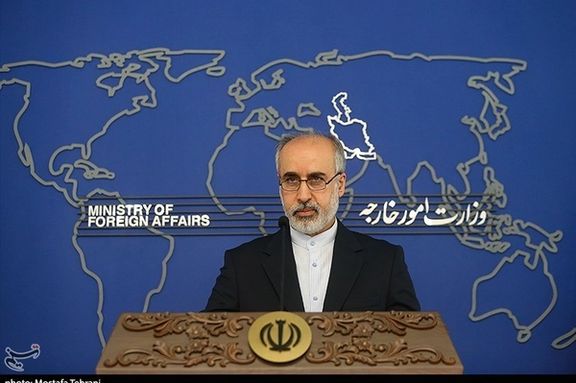
The process of releasing US prisoners held in Iran will take up to two months, Iran's Foreign Ministry Spokesperson Nasser Kanaani said Monday during a press conference.

The process of releasing US prisoners held in Iran will take up to two months, Iran's Foreign Ministry Spokesperson Nasser Kanaani said Monday during a press conference.
"A specific time frame has been announced by relevant authorities, and it will take a maximum of two months for this process to take place," Kanaani said.
Earlier this month, Tehran and Washington reached an agreement whereby five US citizens held hostage in Iran would be freed while $6bn of Iranian assets frozen in South Korea would be released.
Iranian assets that had been frozen in South Korea were transferred to Switzerland's central bank last week for exchange and transfer to Iranian bank accounts in Qatar, South Korean media reported on Monday.
The deal foresees the funds remaining in Qatar to be spent on Iranian imports of food, medicine and other “non-sanctionable” goods. The US insists it will have oversight to make sure that the funds are not used for other purposes, however, Iran has said it has full control over the money.
Washington would also release some Iranians from US prisons, Iran said.
Iran allowed four detained US citizens to move into house arrest from Tehran's Evin prison, a lawyer for one said. A fifth was already under home confinement.
The deal has led to criticism in the United States by those who say the $6 billion is essentially a ransom paid for the hostages and it will only encourage Iran and other actors to detain Americans and demand money or concessions. Twenty-six Republican Senators have written to President Joe Biden demanding clarifications. Critics also argue that the money will provide Iran with the ability to spread its terror activities and other malign acts.

A recent report by Middle East Forum (MEF) delves into Amin family's US pistachio business, uncovering its role in advancing Islamic Republic's agenda.
The shocking six-month investigation of the Philadelphia-based MEF revealed “The Amin family’s activities in Iran… have involved collaboration with Iranian institutions sanctioned by the US government or which are linked to violent regime entities, such as the Iran’s Islamic Revolutionary Guard Corps (IRGC), a designated terrorist group under United States law.”
MEF sounded the national security alarm bells, urging that the US Department of the Treasury’s Office of Foreign Assets Control (OFAC) and Department of Justice’s Foreign Agents Registration Act (FARA) unit launch investigations into Amin’s questionable business practices and the family’s alleged pro-Iran regime network.
The origin of the Amin’s family pistachio empire started with Ali Akbar Amin who moved to the US in 1952. According to the MEF investigation, “Around 2002, he established the Anar branch of Iran’s Azad University, which analysts today consider an important component of Tehran’s ‘soft power’ efforts. University faculty members stand accused of working on the regime’s nuclear and missile programs.”
The Amin family’s charities-- Maximum Difference and the Amin Foundation—have also pumped significant funds into the National Iranian American Council (NIAC)—an American-based organization widely viewed by many Iranians as a lobby entity for the Islamic Republic, although NIAC says it is a non-profit and non-partisan advocacy organization.
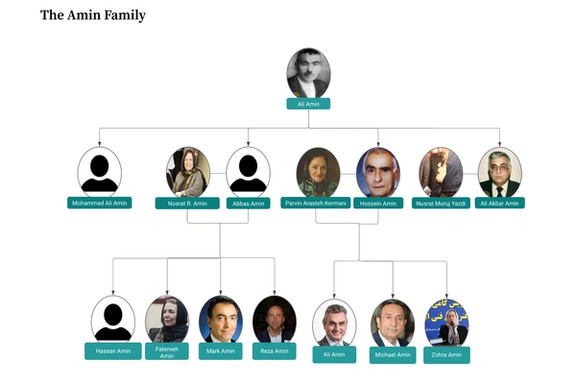
According to MEF, “Since 2015, for instance, both foundations have handed over $400,000 to the National Iranian American Council.”
The authors of the MEF investigation, Kara Hashemi and Sam Westrop, listed a lengthy bill of particulars against the Amin family business dealings with sanctioned Iranian banks and IRGC entities.
According to MEF’s research, the pistachio giant Amin Padidar, founded and run by the Amin family, works with the US-sanctioned Iranian conglomerate Bonyad Mostazafan. The Iranian multi-billion company Mostazafan, according to the US government, is controlled by Supreme Leader Ali Khamenei and the IRGC.
The US Department of Treasury sanctioned Iran’s Bank Sina, which is “Bonyad Mostazafan’s holding company in the investment and financial services industry, “according to the US government.
The EU classified Bank Sina in a list of “Persons and entities involved in nuclear or ballistic missile activities and persons and entities providing support to the Government of Iran.”
The brother of former Iranian president Akbar Hashemi Rafsanjani, whose family comes from the Kerman province, where pistachios are cultivated, referred to the Amin family as his blood relations. Rafsanjani was born into a family of opulent pistachio farmers. The Amin family hails from Rafsanjan in Kerman.
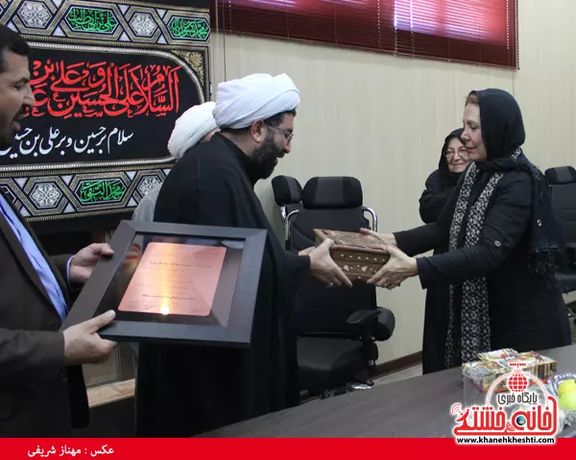
Amin family members live both in California and in Iran. The Amins are one of the giant pistachio producers in the US.
The MEF report said, “Amin Padidar’s parent company, Golrang, is closely involved with the regime and its paramilitary force, the Islamic Revolutionary Guards Corps.”
An additional startling finding of the MEF report is Amin Padidar, collaborates through a trade group known as the Iran Pistachio Association (IPA).
According to the MEF report, “The IRGC-linked company Arian Milan is listed as a financial sponsor of the IPA, alongside Sirjan Bonyad, the primary pistachio subsidiary of the regime’s Bonyad Mostazafan. The Sirjan Bonyad website states that the organization serves to ‘[implement] the policies of Mostazafan Foundation of the Islamic Revolution.’”
In addition to financing NIAC, the Amin family had donated to who’s who of largely pro-Iran regime NGOs in the United States.
MEF wrote, “In 2019 and 2020, the Amin Foundation appeared to split the $50,000 it had given NIAC in previous years, instead now giving $25,000 each year to both NIAC and Quincy. In total, Quincy has received $75,000 from Mark and Reza Amin’s foundation.”
The former NIAC head, Trita Parsi, is a co-founder of the Quincy Institute. In 2012, US District Court for the District of Columbia determined Parsi’s work was “not inconsistent with the idea that he was first and foremost an advocate for the regime.”
MEF revealed that “The Amin Foundation has also given thousands to the Ploughshares Fund, a left-leaning grant-making foundation that Hassan Dai writes has ‘financially supported groups and individuals who advocate for a friendlier policy with Iran and the lifting of economic sanctions.’”
Ploughshares has worked tirelessly to promote the Obama administration’s nuclear deal with Iran and has funded accused regime apologists such as Iran’s former ambassador to Germany, Seyed Hossein Mousavian, who was accused of complicity in Iran’s killing of four Iranian dissidents in Germany in 1992 in Berlin, noted the MEF report.
Iran International previously reported that Mousavian, who teaches at Princeton University, was under fire for bragging about the Iranian regime’s revenge for the US assassination of the US and EU-designated IRGC’s Qassem Soleimani, who coordinated militant groups throughout the region to attack Israel and US interests.
Amin family members have also faced criminal proceeding, including a conviction for illicit transport of $17 million from Iran to the US.
In 2015, Ali Amin (who has the same name as his grandfather) “pleaded guilty to transporting $17 million illegally through unlicensed means from Iran to the United States, using family members and family businesses to effect the transfers. Other Amin family members, including Ali’s brother, as well as his cousins, Fatemeh Amin and her unnamed brothers, were also implicated in the prosecution’s case. Fatemeh was found guilty in a US District Court of having filed a false tax return.”
Fatemeh is a cousin of Ali Amin who is the son of Ali Akbar’s other brother, Hossein Amin, who died in the US in 2008.
Ali Amin’s brother, Michael Amin (also known as Mahmood Michael Amin) is the founder and CEO of Los Angeles-based Primex Worldwide. Primex is major owner of pistachio farms.
MEF also disclosed that ”In 2012, Michael Amin, Mark Amin, his brother Reza Amin, and several others settled with the US Securities and Exchange Commission (SEC) for nearly $2 million after the agency charged them with insider trading concerning a company named DuPont Fabros Technology.”
According to MEF, “Ideologically, several members of the family are openly radical. Michael Amin regularly posts a wide variety of extremist rhetoric on his social media, citing both far-Left and far-Right sources regularly. His posts include wildly anti-Semitic claims about Jewish genetics and alleged Jewish control over the media and the government.”
The Amin family declined to provide a comment to MEF before the publication of its report.

South Korea transferred frozen Iranian funds to Switzerland's central bank last week for exchange and transfer to Qatar, South Korean media reported on Monday.
The Swiss National Bank plans to exchange its $6 billion holdings in won for dollars and then euros in the currency market, converting about 300 billion won ($223.85 million) to 400 billion each day for next five weeks, Yonhap Infomax reported, citing an unnamed currency market source.
An official at South Korea's finance ministry declined to confirm the report, citing the legal and diplomatic sensitivity of the matter.
Iran and the United States recently reached an agreement in which five US citizens held hostage in Iran would be released while Iranian assets in South Korea would be unfrozen and sent to an account in Qatar that Iran could access. The Biden administration insists that the funds can only be used by Iran to purchase food, medicine and other humanitarian needs, but the Iranian foreign ministry and officials have insisted there would be no restrictions on the funds.
Iranian President Ebrahim Raisi said last week that the released assets would be used to enhance domestic production.
The deal has led to a lot of criticism in the United States by those who say the $6 billion is essentially a ransom paid for five hostages and it will only encourage Iran and other actors to detain Americans and demand money or concessions. Twenty-six Republican Senators have written to President Joe Biden demanding clarifications. Critics also argue that the money will provide Iran with the ability to spread its terror activities and other malign acts.
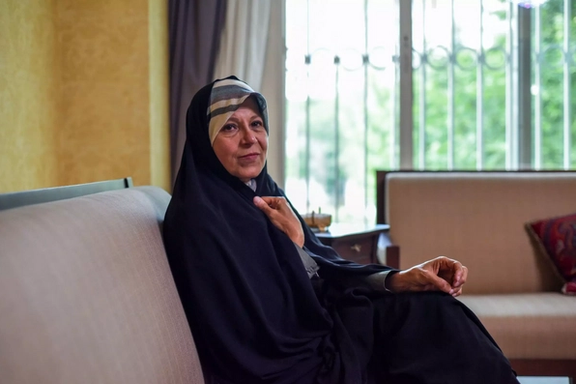
Faezeh Hashemi, the jailed daughter of a former president has written from prison that Iranians have long moved past the reformists and reject the Islamic Republic.
In a letter from prison addressed to a top reformist politician, Hossein Marashi, she criticized him for urging the people to vote in the upcoming March parliamentary elections. "Our weapon is our refusal, and testing the proven is a mistake," Hashemi said referring to a widespread belief in Iran that it matters little which regime faction wins elections. Marashi happens to be Hashemi’s maternal uncle.
In July, Marashi had expressed deep pessimism about regime politicians but nevertheless urged the people to vote. "I have no hope in Iranian politicians. The elites in the society should come forward with determination and make their point, and whatever they need to do. I have hope that the people will change the scene."
He was reacting to an earlier letter from Hashemi urging voters to boycott the elections on the same grounds that all previous elections, whether won by conservatives or reformists did not alter the regime’s core domestic and foreign policies.
Hashemi, daughter of late President Ali Akbar Hashemi Rafsanjani, was arrested in September 2022, days after nationwide anti-regime protests broke out, as the government tried to control the situation by detaining well-known critics and many journalists. She was sentenced to a five-year prison term in January.
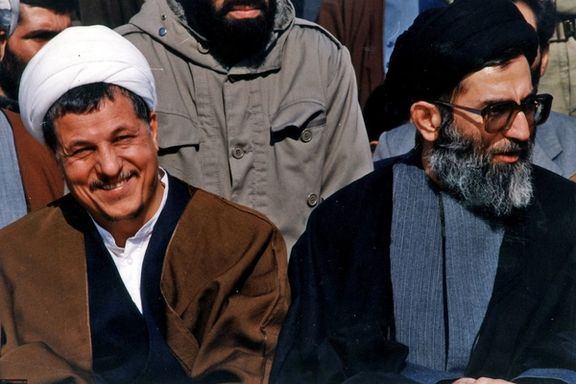
Faezeh’s father was the second most powerful man in the Islamic regime in the 1990s and early 2000s, when he served as president (1989-1997) and held influence and key positions, until Supreme Leader Ali Khamenei gradually pushed him aside. Rafsanjani was the key cleric who helped Khamenei succeed the founder of the Islamic Republic, Ruhollah Khomeini when he died in 1989, although he did not have the required clerical rank and credentials for the post.
Khamenei’s men continued to persecute members of the Hashemi clan, who had become affluent and had legal vulnerabilities that could be exploited by Khamenei’s courts and intelligence services. Faezeh Hashemi who served as a member of parliament, became increasingly estranged from the regime and began defending women’s rights and hurling criticism at the regime that indirectly targeted Khamenei. She was tip-toeing on dangerous ground, and the regime could not take a risk once angry protesters poured into the streets after Mahsa Amini died in hijab police custody last September, and she was jailed.
Hashemi lashed out at the regime in her letter: "Issues like absolute power [of Supreme Leader], the complete dominance of the IRGC in all areas, aggressive foreign policy, the shameful economic situation, lawlessness, deceit and hypocrisy, manipulation, disregard for national interests and public demands, lack of a national perspective, security-driven control over all matters, lack of rationality and strategy in governing the country, extensive and systemic corruption and destruction, severe suppression of any criticism and unjust judicial verdicts, general disillusionment and public hatred of the situation..."
In another part of her letter, Hashemi considered the people's solution to be "engaging in civil disobedience," "ignoring the demands [of officials]," and "increasing pressure and pushing them into a corner."
Hashemi also called her father’s death in January 2017 a “martyrdom”, referring to suspicions that he was killed by regime agents. Rafsanjani died at 82 while enjoying himself in a swimming pool where there were no witnesses. The family called his death “suspicious”but did not take any legal action, which would hardly achieve any results given the total submission of courts and police to the Revolutionary Guard and intelligence agencies ultimately controlled by Khamenei.
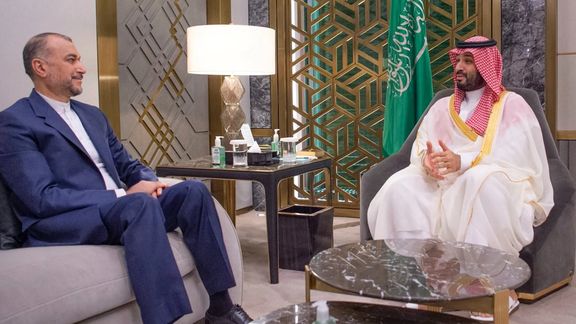
The ongoing détente between Iran and Saudi Arabia has triggered debates in Tehran-based media, with increasing calls for a major shift in foreign policy.
While hardliners are generally cautious, those who favor a change in Theran’s foreign policy toward less confrontation with regional countries and the West, showcase the détente with Riyadh as an example of what needs to be done to save Iran from its current economic crisis.
Writing in the relatively independent website Aftab News, specialist on Arab issues Abolfazl Karimi warned Iran’s hardliners and officials not to underestimate Saudi Crown Prince Mohammed bin Salman. He notes that some regime figures wring their hands waiting for bin Salaman’s grand ideas to fail and perhaps drag Saudi Arabia into chaos and mayhem. However, they should not overlook the Arab prince’s personality and determination to bring change and make the Kingdom a formidable rival to Iran.
Karimi argues that bin Salman has the positive attitude of accepting his weaknesses and limitations. He is also enthusiastic about new technologies and is determined to encourage his country’s youth to take the initiative. His style of governance is also strong with upholding meritocracy instead of the Middle Eastern habit of preferring family and clan ties. He is persistent and follows issues until to their full resolution.
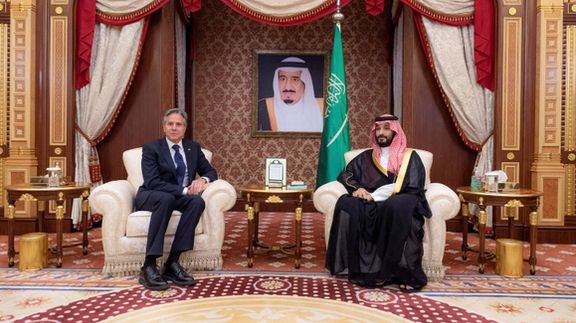
Another relatively independent website, Rouydad24 on Sunday published an article headlined, “Why does the Islamic Republic incur costs for itself in foreign policy?” Blaming the hardliners, the website cited ultraconservative figures in the recent past berating Saudi Arabia and bin-Salman, while now they are speaking softly and with respect, when Iran’s foreign minister visits the kingdom.
Abdolreza Farajirad, a former Iranian ambassador to Hungary and Belgium told Fararu website Sunday that Iran must do its utmost to be a part of bin Salman’s vision in forging a “European Union” in the Middle East. Iran has no choice but to be a part of this trend, with open and region-wide economic ties, cross-investments and trade.
The former diplomat and expert argued that the prospect of full relations between Saudi Arabia and Israel should not impede Iran’s openness toward its Arab neighbors, some of whom have established relations with the Jewish state. Iran is now less sensitive to Muslim countries establishing ties with Israel, unlike in the past when Tehran would react very negatively, Farajirad maintained.
He argued, however, that “Iran must first shake off [US and European] sanctions and embark on a new economic phase” of foreign policy, in order to join a regional coalition of progress and development.
This approach is what many other pundits and even regime politicians have been advocating in the past three years, as US sanctions have evidently crippled Iran’s economy. But few would dare to say openly that resolving the nuclear dispute with the West depends on the will of Iran’s ruler Ali Khamenei.
Farajirad stated his conviction that bilateral diplomatic visit with Arab neighbors is not sufficient to propel Iran into a whole new era of regional relations. He insisted that Tehran must first establish mutual trust with Riyadh, although he did not mention Iran’s confrontational policy in the middle East, given that he was speaking to a media outlet in Tehran.
The Revolutionary Guard have been arming the Houthis in Yemen with sophisticated missiles and drone that they have used to attack Saudi Arabia. Iran has also established an array of Shiite proxy militia forces throughout the region, which Riyadh and its Sunni Arab allies see as Tehran’s plan to dominate the neighboring countries.
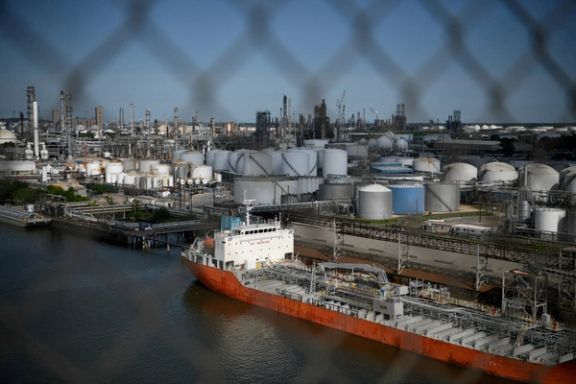
A tanker seized by the US for carrying sanctioned Iranian crude oil has begun offloading its cargo despite Tehran’s threats against shipping shipping companies.
The Associated Press cited tanker-tracking data on Sunday that showed the oil cargo is being transferred from Marshall Islands-flagged Suez Rajan, a tanker anchored off the coast of Texas, near Galveston about 50 miles (80 km) from Houston.
The owners of the Suez Rajan, the Los Angeles-based private equity firm Oaktree Capital Management, did not immediately respond to requests for comment about the ship-to-ship transfer.
On Wednesday, a bipartisan group of US lawmakers from the House and Senate asked the Biden administration to respond to “unprecedented intimidation” tactics from Iran that have prevented American firms from offloading the confiscated oil cargo.
The US seized the Iranian oil onboard the ship late in May in accordance with US sanctions, but the oil had reportedly not been offloaded as US federal prosecutors have faced challenges in auctioning off the 800,000 barrels of oil. The lawmakers estimated the value of the oil to be $56 million.
According to the Wall Street Journal, the US companies are reluctant to unload the oil due to concerns about potential Iranian reprisals, particularly threats of violence by Iran’s Revolutionary Guards. Iran's IRGC navy commander Alireza Tangsiri warned in July that Tehran would retaliate against any oil company involved in unloading the Iranian oil.
The US Navy has increased its presence steadily in recent weeks in the Mideast, sending the troop-and-helicopter-carrying USS Bataan through the Strait of Hormuz in recent days and considering putting armed personnel on commercial ships traveling through the strait to stop Iran from seizing additional ships.